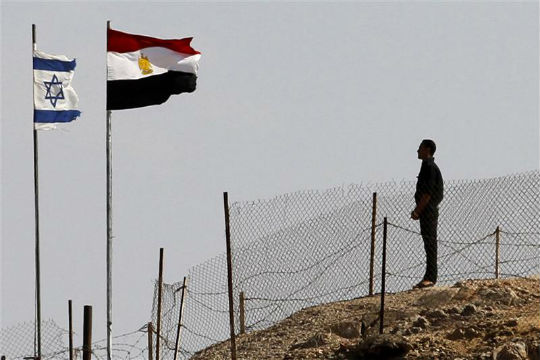Latest NEWS
- Aswat Masriya, the last word
- Roundup of Egypt's press headlines on March 15, 2017
- Roundup of Egypt's press headlines on March 14, 2017
- Former Egyptian President Hosni Mubarak to be released: lawyer
- Roundup of Egypt's press headlines on March 13, 2017
- Egypt's capital set to grow by half a million in 2017
- Egypt's wheat reserves to double with start of harvest -supply min
- Roundup of Egypt's press headlines on March 12, 2017
15 Sudanese nationals killed in attempt to enter Israel

The border that divides Egypt and Israel - Mohamed Abdel Wahab/Reuters
CAIRO, Nov. 16 (Aswat Masriya) - Fifteen Sudanese nationals were shot dead in Egypt's North Sinai, near the Egypt-Israeli border, in the late hours of Sunday evening, as they attempted to cross over to Israel.
With no official statement published on the circumstances of their death, the incident is shrouded in confusion on how they were killed and who shot them.
Initially, a source that preferred to remain anonymous told Aswat Masriya that Egyptian security forces fired warning shots in the air to stop the migrants from crossing the border south of Rafah.
When the migrants refused to heed the warning and retaliated with gunfire aimed at the border security, an exchange of fire ensued. Fifteen were reportedly killed and eight injured.
Security forces arrested six others, who have been referred to investigation, according to the source.
In the absence of an official statement, it is still unclear who is responsible. Aswat Masriya was unable to independently verify this version of events.
Some foreign news reports have intimated that the attempted migrants may have been killed in the crossfire between border security and traffickers.
If the Sudanese nationals were killed by Egyptian border police, it would not be a precedent.
In a report dating back to 2008, Human Rights Watch (HRW) said Egypt should end the "shoot to stop" policy to prevent migrants from crossing. The watchdog said Egypt should "halt the use of lethal force against border crossers and all deportations of persons to countries where they risk persecution or ill-treatment."
Egypt's Sinai desert has for years been used as a route to Israel by thousands of migrants from different parts of Africa, including Sudan and Eritrea, who pay smugglers in the hope of greener pastures beyond Egypt's borders.
But since 2010, according to HRW, many have ended up in North Sinai against their will. They were kidnapped and tortured by traffickers for ransom, mainly by the Rashaida tribe. Traffickers often sold the victims to other traffickers instead of releasing them after the ransom was paid. Many victims were Eritreans but there were others from Sudan and Ethiopia.
A report released in February 2014 by Human Rights Watch said there was "collusion of Sudanese and Egyptian security forces with the traffickers." The report was based on dozens of interviews with victims and two traffickers.
But the long journey which takes the migrants, some of them seeking asylum from conflict-ridden countries, to Egypt's Sinai and finally to Israel, often ends badly.
The Israeli state does not welcome migrants and has taken several measures to stop their influx.
In January 2012, Israel passed a law that allows the "automatic detention" of anyone who enters the country without permission, including asylum seekers, Amnesty International criticized in a statement after the Israeli parliament passed the law.
The watchdog said the law was aimed "at those entering via the Egyptian border."
Then-deupty director for MENA at Amnesty Ann Harrison, said "Israel has the right to protect its borders, but it does not have the right to abandon its international human rights obligations to asylum-seekers, refugees and migrants, or to criminalize them as 'infiltrators', which only fuels xenophobia and discrimination."
More recently, in December 2013, Israel completed the construction of a barrier along the Egyptian-Israeli border to block migrants' access to Israel through Egypt.










